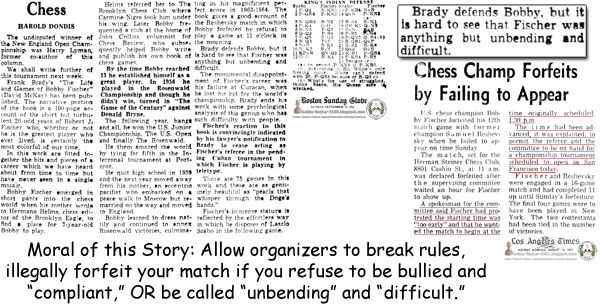The Boston Globe Boston, Massachusetts Sunday, September 12, 1965 - Page 85
Frank Brady Rebuffed by Fischer
Frank Brady's “The Life and Games of Bobby Fischer” David McKay) has been published. The narrative portion of the book is a 100-page account of the short but turbulent 20-odd years of Robert J. Fischer who, whether or not he is the greatest player who ever lived, is certainly the most colorful of our time.
In this work are fitted together the bits and pieces of a career which we have heard about from time to time but have never seen in a single mosaic.
Bobby Fischer emerged in short pants into the chess world when his mother wrote to Hermann Helms, chess editor of the Brooklyn Eagle, to find a place for 7-year-old Bobby to play.
Helms referred her to The Brooklyn Chess Club where Carmine Nigro took him under his wing. Later Bobby frequented a club at the home of John Collins, columnist for Chess Review, who subsequently helped Bobby write and publish his own book of chess games.
By the time Bobby reached 13 he established himself as a great player. In 1956 he played in the Rosenwald Championship and though he didn't win, turned in “The Game of the Century” against Donald Byrne.
The following year, bangs and all, he won the U.S. Junior Championship, The U.S. Open and finally The Rosenwald.
He then amazed the world by tying for fifth in the Interzonal tournament at Portoroz.
He quit high school in 1959 and the next year moved away from his mother, an eccentric pacifist who embarked on a peace walk to Moscow but remarried on the way and moved to England.
Bobby learned to dress nattily and continued to annex Rosenwald victories, culminating in his magnificent perfect score in 1963-1964. The book gives a good account of the Reshevsky match in which Bobby forfeited by refusal to play a game at 11 o'clock in the morning.
Brady defends Bobby, but it is hard to see that Fischer was anything but unbending and difficult.
[EDIT: See the following articles from Los Angeles Times, which cites a spokesman from the organizers at the Fischer-Reshevsky Series, which admit the time was inappropriately rescheduled (without Fischer's consent, flagrant violation of rules) to accommodate referee Irving Rivise' personal trip to the San Francisco U.S. Open.
The Los Angeles Times Los Angeles, California Monday, August 14, 1961 - Page 73, “Chess Champ Forfeits by Failing to Appear”]
- https://bobby-fischer-1961.blogspot.com/2018/06/chess-champ-forfeits-by-failing-to.html
- https://www.newspapers.com/clip/21207710/chess_champ_forfeits_by_failing_to/
The monumental disappointment of Fischer's career was his failure at Curacao, when he lost his bid for the world's championship. Brady ends his work with some psychological analysis of this genius who has such difficulty with people.
[EDIT: The San Francisco Examiner's H.E.F. Donohue provides his own insightful “Psychoanalysis of Frank Brady” which touches on the exaggerated perceptions and possessiveness over the life of Bobby Fischer, as “personal property”. Such a bleak portrait is painted, perhaps, to prevent others from attempting to take a closer look at the great Fischer and come to their own, different conclusions.
The San Francisco Examiner San Francisco, California Sunday, September 05, 1965 - Page 156, “Nobody's Pawn”]
Fischer's reaction to this book is convincingly indicated by his lawyer's notification to Brady to cease acting as Fischer's referee in the pending Cuban tournament in which Fischer is playing by teletype.
There are 75 games in this work and these are as genuinely beautiful as “pearls that whisper through the Doge's hands.” Fischer's immense stature is reflected by the effortless way in which he disposes of Laszlo Szabo in the following game.























